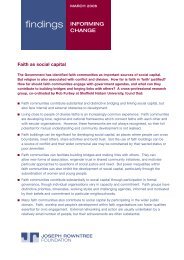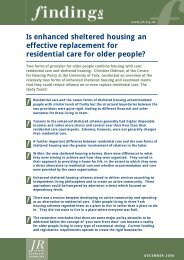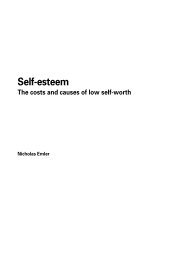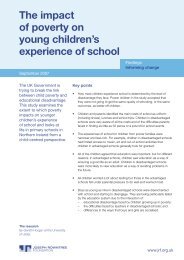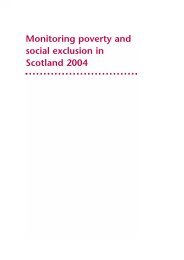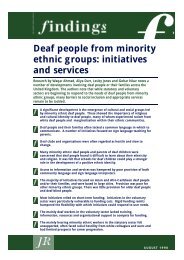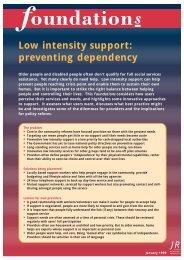Community participation - Joseph Rowntree Foundation
Community participation - Joseph Rowntree Foundation
Community participation - Joseph Rowntree Foundation
You also want an ePaper? Increase the reach of your titles
YUMPU automatically turns print PDFs into web optimized ePapers that Google loves.
Making the most of community <strong>participation</strong>: The 1% Solution<br />
representative democracy. Unless we can replenish these participatory energies,<br />
democracy withers. 2<br />
But the other lesson of history is that informal <strong>participation</strong> can strengthen<br />
democracy without the formal institutions of governance themselves being<br />
particularly participatory. As democratic theorists since Madison have argued, the<br />
hallmark of successful democracy is not the absence of elites but the way they are<br />
embedded in a genuine pluralism, which holds them in check, calls them to account,<br />
limits the influence of a single elite across different centres of power and, most<br />
crucially, prevents the transient power of one elite from crystallising into something<br />
more permanent. 3<br />
The way to do that is to ensure that the right connections are made in the right<br />
places between formal <strong>participation</strong> by elites in the institutions of governance and<br />
more informal <strong>participation</strong> by people in the institutions of everyday civic life: book<br />
clubs, gyms, SureStart groups, faith groups and so on. One group we spoke to had<br />
used different colour Monopoly money to allow both parents and staff at a centre to<br />
express their views on what the spending priorities for a service should be. As one of<br />
our interviewees put it:<br />
People already congregate in school, church, at the bus stop … We need<br />
to work harder to find them – don’t assume if they don’t turn up to<br />
meetings they’re not interested.<br />
For, by itself, the existence of a community elite is not evidence that policies to<br />
promote community <strong>participation</strong> have failed. The existence of a community elite<br />
disconnected from local civic culture is. What is worrying is how much attention is<br />
paid to creating formal structures that, in all likelihood, will only ever be inhabited by<br />
the committed few and how little attention is paid to ensuring that these structures<br />
interact with, and are embedded in, the places and organisations in and through<br />
which people actually live their lives. As we have seen, this cannot be left to chance.<br />
So, rather than ignore the role of elites, we should draw attention to it and ask how it<br />
can be aligned both with existing representative structures, like local authorities, and<br />
with these much more informal forms of <strong>participation</strong> in mutually invigorating ways.<br />
49



